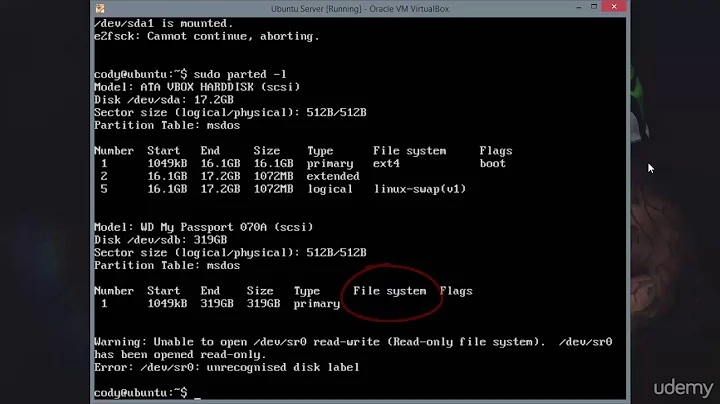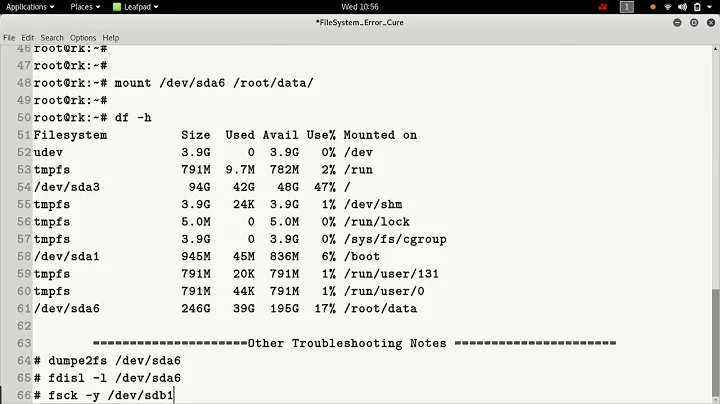superblock errors?
3,099
/dev/sda is the wrong device to run fsck on. sda is the whole disk. Your Linux filesystem is on /dev/sda5.
Related videos on Youtube
Author by
Jezen Thomas
Updated on September 18, 2022Comments
-
 Jezen Thomas over 1 year
Jezen Thomas over 1 yearI would like to add a language code segment to my URIs in CodeIgniter, but I'd like to somehow — possibly with routing — force the browser to stop interpreting a language code as a path.
I haven't yet successfully implemented any of the i18n libraries in my CodeIgniter install, and I'm fairly certain my problem is simple enough to solve without a library anyway.
The method I had in mind was simply to load the appropriate language files respective of the language code that appears in the URI.
For example
http://example.com/about // Default language http://example.com/sv/about // Load Swedish languageHere's the controller logic:
<?php // ** Update ** // The following updated code works, as long as the language code appears // at the end of the URI, e.g, http://example.com/about/sv // // Ideally, I would like the language code segment to always appear first. // // There is also the problem of keeping the language selected while // navigating around the site… class Pages extends CI_Controller { public function view ($page = 'home') { if (!file_exists('application/views/pages/'.$page.'.php')) show_404(); $uri = explode("/", $_SERVER['REQUEST_URI']); $lang_code = end($uri); $data['title'] = $lang_code; switch ($lang_code) { case "sv": $the_language = "swedish"; break; case "no": $the_language = "norwegian"; break; default: $the_language = "english"; } $this->lang->load('general',$the_language); $this->load->view('templates/header', $data); $this->load->view('pages/'.$page, $data); $this->load->view('templates/footer', $data); } } ?>Am I going about this the wrong way? If so, why? Please avoid canned responses.
-
jippie about 12 yearsAlways copy exact error messages when asking questions, don't try telling about what you understood from them.
-
 Jezen Thomas over 11 yearsYeah, for that reason I really want the language code to exist in the URI.
Jezen Thomas over 11 yearsYeah, for that reason I really want the language code to exist in the URI. -
danneth over 11 yearsThere's surely a better way to do this (htaccess perhaps) but perhaps you could alter/extend the routing class to check the first URI segment is a language (pseudocode here)
if (in_array(uri_segment(1), array('sv', 'en')) { set_language_var; strip_first_segment_from_uri; } continue routing; -
 Jezen Thomas over 11 yearsMy solution is sort of half-way there now (code updated); I don't really understand how uri-routing works.
Jezen Thomas over 11 yearsMy solution is sort of half-way there now (code updated); I don't really understand how uri-routing works. -
danneth over 11 yearsThere is a built in function
$this->uri->segment(n)which gives you the segments of the URI without having to doexplode. As for keeping the language selection you could set$data['lang_path'] = $lang_code . '/'if a language is selected (and leave it as an empty string otherwise). Then you will have to prepend all your links with this variable. I again stand with the suggestion of just using a cookie. I think this path will be rather complex once you start passing data to your controller(s). -
 Jezen Thomas over 11 years@Mudshark I don't understand how that works. This is why I'm asking the question.
Jezen Thomas over 11 years@Mudshark I don't understand how that works. This is why I'm asking the question.
-
-
danneth over 11 yearsAn alternative solution is to put the selection in a cookie, and then create your own extension to the CI_Controller which attempts to read the language selection (or set default), and place that in
$this->the_languageor similar. Of course having the language code in the URL makes it clear for users what language to expect, so it has it's benefits as well. -
 Jezen Thomas over 11 yearsThat's great! It's beginning to work as I'd like it to. A couple of things though: 1) The language segment now displays the language name, instead of the language code, i.e.,
Jezen Thomas over 11 yearsThat's great! It's beginning to work as I'd like it to. A couple of things though: 1) The language segment now displays the language name, instead of the language code, i.e.,http://example.com/english/home; How should I shorten it? 2) It needs a language segment, otherwise nothing works, i.e.,http://example.com/homedoesn't work. How can I default the site to English? It shouldn't display the language code in the URI if it's in the default language. -
 Mudshark over 11 yearsBit pressed for time here, but in routes.php you could start off with
Mudshark over 11 yearsBit pressed for time here, but in routes.php you could start off with$route['default_controller'] = "pages/view/sv";. As for english vs en: create an array in the constructor,$languages = array('en' => english', 'sv' => 'swedish', etc);, then in your view function determine the language as$current_lang = $this->languages[$this->language] -
 Jezen Thomas over 11 yearsYour answer has helped considerably, so I'm upvoting and marking as correct. I'm not all the way there yet though, so I'm continuing in another question.
Jezen Thomas over 11 yearsYour answer has helped considerably, so I'm upvoting and marking as correct. I'm not all the way there yet though, so I'm continuing in another question.




